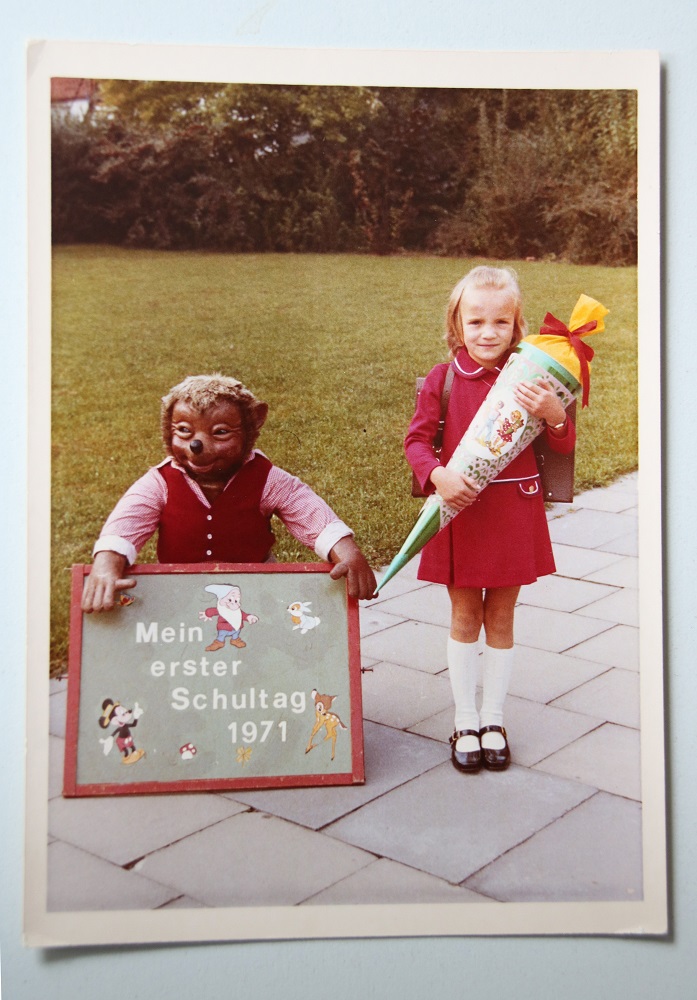By Heidi Honemann, Trott-War vendor
My grandmother had a big chicken farm and I knew where our food came from. I liked milk and the cows that it came from too. I tried to push the fact that they would be slaughtered one day out of my mind.
At home, in Leonberg, I had a hard time. I never played with other children in kindergarten. The kids were loud and had friends; I had no friends and no siblings.
In kindergarten, I tried to hide the fact that I always sat alone as skilfully as I possibly could. I played with Muckelsteinchen [small, colourful mosaic stones], where I could lay out stones decorated with stars or flower meadows, because it’s something that you can play without a partner.
By hiding the fact that I was always alone, I was playing a sad sort of game of hide and seek with myself, in which I tried to avoid the criticism of the other children and the kindergarten teacher. I did sometimes try to get my teacher’s attention, for example, by trying to show her how independent I was and by tying my waistcoat or tops around my waist without her help. But it didn’t work.
I also kept my mouth shut at home. Perhaps it would have helped if my mother had sat down on the floor with me and talked to me about which children from kindergarten I could play certain games with. That is, if we had ever played on the floor every afternoon at all. In reality, it didn’t work out that way and I was criticised for not having any friends.

Fear of the expectations of others
I wish that children could, every once in a while, stay in a stranger’s family for up to a week. That way they would get to know other customs and learn about different ways of doing things. Children would become more self-reliant and more self-confident, and they would have something interesting to talk to their parents about after their time away. Maybe my mother would have been happy if I had cheered her up by telling her about something that I’d learned in the world outside our home.
Although I was fond of my parents and the kindergarten kids, I was glad when I finally got to preschool. We cooked with Miss Wörner and did arts and crafts. Over time, I gained more confidence in myself and I looked forward to learning about things at school.
My first day began with a Schultüte [a colourful cardboard cone filled with sweets and gifts that is given to children on their first day of school] and I was wearing a red dress sent from my aunt in Vienna. I was photographed that day and the photo shows me standing beside a slate with a hedgehog painted on it.
I found learning fun and it was easy for me. Sometimes I found other girls to play jump rope with during the break. Apart from that, I was a very quiet child.
I wish that children could, every once in a while, stay in a stranger’s family for up to a week. That way they would get to know other customs and learn about different ways of doing things.
I had a bit of a different character to the other kids. This wouldn’t have been a bad thing if I had had a friend. But I was afraid to invite other children into my home. I thought that I would die of embarrassment if I did that, because I was so anxious that I wouldn’t be able to meet the inner expectations of both my mother and the other children.
Better to kiss than to talk
My problem was that I didn’t understand why the other children talked so much and why talking was such an important part of being together for them. I would have preferred to kiss.
I would have liked to sit on the floor in my room or at school and kiss. Of course, I would also have been silent for a long time! Being quiet for a long time is my way of doing things: it allows me to feel connected to others and I enjoy the feeling of trust and togetherness that it brings. We could have come up with a game together. We would surely also would have had the chance to say that we would stick together for a lifetime and support each other.
For me, that is the value of being quiet: say the most important thing and work things out – and leave out the rest.
Translated from German by Katharina Siebert




















